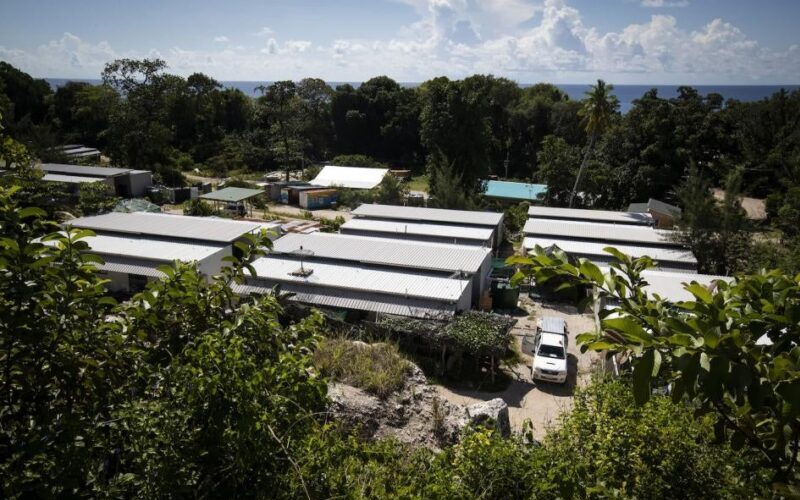Despite a High Court ruling declaring the indefinite detention of refugees unlawful, the Federal Government has started sending refugees back to Nauru indefinitely. Janet Pelly reports.
In November 2023, the High Court of Australia ruled indefinite immigration detention unlawful (NZYQ).
It was a unanimous landmark decision, overturning the 4-3 Al-Kateb v Godwin precedent (2004) and ensuring that, where people are detained for the purpose of removal, that removal must be achievable in the reasonably foreseeable future.
Over 300 of the 354 men impacted by the judgment were child or adult refugees; the rest are stateless or can’t be returned to their countries of birth.
Their visas were cancelled for a variety of reasons, but, much like Peter Dutton did when the Medevac legislation was being debated in 2019, politicians and media have flagged only the most serious cases.
In the 2 years after NZYQ, several rounds of legislation have sought to undermine the separation of powers. There have been efforts to enact preventive detention (unsuccessful), force punitive visa conditions like ankle bracelets (unsuccessful) and refuse due process (being challenged).
Exile to a vanishing shore: human rights, climate and the Nauru ‘solution’
Detention by another name
In the two weeks since a 66-year-old man in poor health became the first post-NZYQ deportee, we’re starting to see what the Nauru deal might look like, despite continuing secrecy surrounding the Memoranudm of Understanding (MoU) the government has entered into with Nauru.
At least three men are now isolated in the 21sqkm island’s ‘regional processing centre’. They’ve been told it’s for quarantine purposes, but there’s no timeframe or information about how (as claimed) they will live freely in the Nauruan community,
on 30-year visas they didn’t apply for.
In the latest of several High Court challenges to the deal, lawyers are arguing that a man, known in court as TCXM, was wrongly denied procedural fairness when the Australian government applied for a visa on his behalf to enter Nauru. They also argue that he has a potentially fatal health condition that poses a barrier to his removal.
The Human Rights Law Centre has applied to be heard as a ‘friend of the court,’ to argue that the power to remove people from Australia does not allow them to be sent to places where they would suffer serious harm or death.
Sanmati Verma, Legal Director of the Human Rights Law Centre, said “many of the people caught by the Nauru deal suffer from lifelong health conditions, caused or exacerbated by their time in indefinite immigration detention. For them, being sent to Nauru will be a death sentence – and our government knows it.”
In one example, a man with Stage 4 cancer will be deported because Australia’s legislation refuses him the right to have his health needs considered, despite Nauru not having the necessary treatment facilities. As seen in Nauru’s detention camps (2012-2022), legal challenges have been required again and again to evacuate people for health care not available locally.
Tony Burke has repeatedly said that if your visa is cancelled, you should leave. Selectively, this makes sense. However, refusing to consider what might happen in the receiving country means Australia is ignoring the legal principle of reasonable practicability of a person’s removal.
Whatever the result of the High Court’s deliberations, this raises an important philosophical principle. If a course of action can only be achieved by denying people the right to present relevant information, what does that say about the state of our democracy?
The politics of criminalisation
Watching the Nauru deal unfold, the parallels with Robodebt are striking. “We’ll find you, we’ll track you down, you will have to pay those debts and you may end up in prison”, said then-Minister for Human Services, Alan Tudge.
Some might argue that most of the NZYQ group are actual criminals, but this denies the purpose of the justice system (rehabilitation). Is every person a lifetime criminal once convicted of a crime, or is that label reserved for people born in another country, no matter how long they’ve lived in Australia?
Speaking with people facing exile to Nauru raises some important issues:
A key one is poverty. Very few people can afford a lawyer for what is often a long fight to appeal visa cancellation, so they get stuck in detention for years with failing health and watching family falling further into financial and emotional stress. The NZYQ-affected men I speak to say they just stay quiet and hope no-one will notice them – not a solution, but not surprising.
The inconsistency of visa reinstatement is another issue. Men I’ve spoken with ask why sex offenders get their visas back but they have to be sent to Nauru for 30 years. A 2019 SMH investigation pointed out similar inconsistencies and raised serious questions about the opaque review process.
Border integrity vs narrative control
It’s tempting to see the political reaction to NZYQ as a performative flex or policy over-reach.
But ploys like this persist because they work. They reassure us that someone else is to blame, someone else is dangerous, someone else should pay the price for our comfort .
This isn’t about border integrity, it’s about narrative control,
a government protecting its electoral prospects through fear and exclusion.
Indefinite detention may not survive in law, but without challenge, it will certainly survive in practice – rebadged, outsourced and hidden in secret MOUs.
Janet Pelly is a Melbourne-based refugee and detention rights advocate. She has worked with Human Rights 4 All since 2019.

